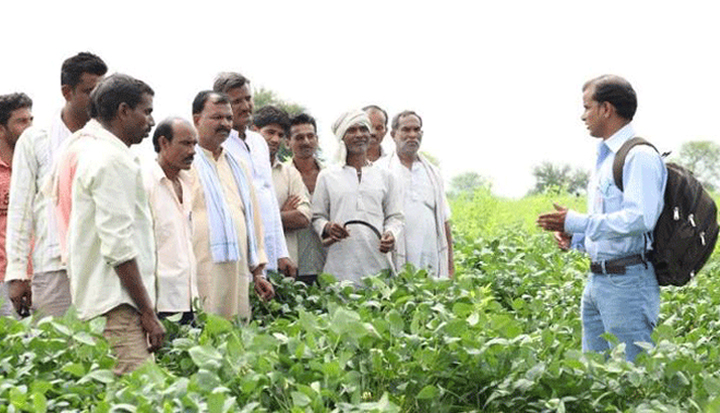An estimated 1.5 billion people directly depend on agriculture for their income with smallholder farmers responsible for almost 80% of all food consumed in the developing world. Agriculture is the biggest industry sector in the world – and one that is highly sensitive to changing temperatures and weather patterns.
Climate change challenges agricultural production of smallholders
Faced with upward trends in global temperatures and the increased frequency and intensity of extreme weather events, especially smallholder farmers are struggling to cope with the negative effects of climate change. Climate change alters temperature and precipitation patterns causing both direct effects on crop production and indirect effects in irrigation water availability. Frequent droughts, floods and torrential rainfalls are most prominent natural hazards that farmers must face.
Especially smallholder farmers tend to have very little economic resources, hampering their ability to effectively adapt to these changes. Small scale agricultural production is generally very low without quality inputs such as fertilizer, improved seeds or consistent irrigation. For instance, most of the 1.5 billion farmers solely rely on rainfall for irrigation, making them highly dependent weather patterns.
Basic irrigation systems could double a field’s productivity and safeguard crops from irregular rainfalls. In fact, drip irrigation is probably the most effective way for smallholder farmers to adapt to climate change. Micro-irrigation reduces the use of water by 50 to 80% as compared to flood irrigation and increases yields by 50 to 200%. In addition, it reduces the need for fertilizer by 30 to 40%, resulting in a significant increase in both crops and income for farmers.
Businesses reduce sensitivity of smallholders against climate risks
Recognizing the resulting demand for low-cost technology, companies around the world have developed innovative holistic solutions that reduce framers’ sensitivity to natural hazards like drought or floods.
By selling agricultural inputs to smallholders, companies can profitably build new markets for improved seeds, feed, fertilizer, plant protection products, irrigation systems, machinery or other production factors. Input markets in Africa, for example, are estimated to increase from about US$ 8 billion in 2010 to US$ 35 billion a year by 2030.
To ensure that smallholders have the income to pay for these investments, and help boost their demand for high-quality inputs, companies often work with partners to help establish links between the various stages of the value chain. Rather than being simply product providers, companies are thus becoming system and solution providers.
Jain Irrigation realizes market opportunities at the BoP
Companies like JAIN Irrigation Systems in India help smallholder farmers to access the relatively low-cost technology of micro-irrigation. Sold to over 200,000 smallholder farmers each year, JAIN’s main product, “more crop per drop” is an improved drip irrigation system that can easily be adapted to an individual farmer’s specific needs.
 At the same time, JAIN also offers smallholders a buy-back option and purchases their production either at a pre-agreed sales price or at the current market price – whichever is highest at the time of purchase. Through this agreement, farmers can count on having the best price available for their product and have more confidence investing in their futures. The collaboration with JAIN also offers farmers training on good agricultural practices from over one thousand agronomists and irrigation specialists in the field and increases their adaptive capacity to cope with the negative effects of climate change. In addition, JAIN also encourages farmers to get involved in social agro forestry programs in their respective villages – another very effective way to make agriculture more climate resilient.
At the same time, JAIN also offers smallholders a buy-back option and purchases their production either at a pre-agreed sales price or at the current market price – whichever is highest at the time of purchase. Through this agreement, farmers can count on having the best price available for their product and have more confidence investing in their futures. The collaboration with JAIN also offers farmers training on good agricultural practices from over one thousand agronomists and irrigation specialists in the field and increases their adaptive capacity to cope with the negative effects of climate change. In addition, JAIN also encourages farmers to get involved in social agro forestry programs in their respective villages – another very effective way to make agriculture more climate resilient.
For JAIN, this collaboration opens up the possibility to generating increased revenues and value through the sale of micro-irrigation systems, seeds and other JAIN products to farmers that already trust the company.
Businesses increase adaptive capacity of smallholders
Enterprises like Jain Irrigation also increase the adaptive capacity of smallholders by providing them with reliable channels to sell their production at fair prices. In addition to that, companies can support smallholders with good agricultural practices and knowledge on the most effective ways to adapt to climate change.
Results from BASF’s Samruddhi farmer training project in India show, that Samruddhi farmers nearly doubled their average grain yields within three years after receiving the on-field training from BASF agronomists, from 578 kg/acre (2007) to 902 kg/acre (2010), a level close to the world average of 1,020 kg/acre. Average net incomes increased by 64% from 2006 to 2008. In the same period, BASF sales of crop protection products also grew by 60% annually.
Companies that source produce from smallholder farmers also have an interest in reducing supply chain risks by making smallholders climate proof. Coffee, tea and cocoa, but also perennial fruit crops like Litchi or Mango are sourced mainly by smallholder farmers. The Egyptian company Sekem shows that with effective soil management, fertilization and crop rotation, agriculture can even adapt to the hostile conditions of the Egyptian desert. Sekem’s agricultural department is closely involved in the development of quality organic seeds and they provide sustainable technical assistance to agricultural professionals and farmers.
Unilever makes its supply chain climate proof
Unilever is another company that actively invests in the resilience of its smallholder suppliers. As part of their commitment to sustainably source 100% of their agricultural products by 2020, Unilever partners with the Rainforest Alliance to conserve biodiversity and help smallholder farmers secure more reliable incomes.
to conserve biodiversity and help smallholder farmers secure more reliable incomes.
Unilever is by far the biggest player in the world’s tea market. Their tea brand, Lipton, aims to have their entire line of different teas certified by the end of 2015 and already trained over 300,000 farmers to adapt to the Rainforest Alliance standards. One of their focus countries for tea is Turkey, the world’s fifth largest tea producer.
In Turkey, global warming is already negatively affecting the production of tea. In 2014, unprecedented frost and heavy rain led to a 15% drop in annual income for tea producers and manufacturers. Heavy rain caused landslides, wiping out entire farms, while droughts also restricted the crop’s growth.
Unilever started working in Turkey in 2011 and has since trained over 8,000 tea growers with one-to-one trainings on sustainability-related topics such as erosion control, waste management and biodiversity conservation.
These are just some of many examples that illustrate that larger companies can climate proof their value chains while realising profits. In our next blog post, we will closely look into the insurance industry and highlight how innovative insurance models can incentivise risk reducing behaviour of low-income communities. Stay tuned.
This blogpost was authored by Christian Pirzer and is part of the Practitioner Hub’s series on climate change and inclusive business.


